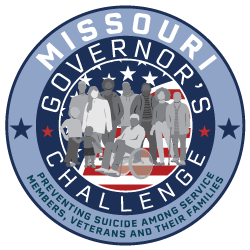Projects
The National Strategy for Preventing Veteran Suicide 2018-2028 provides a framework for identifying priorities. The strategic priorities work together to promote wellness, increase protection, reduce risk and promote effective treatment and recovery. The Missouri Governor’s Challenge team is focusing on three strategic priorities of the National Strategy. There is evidence that these three priority areas can help in making a positive change to prevent suicide in Missouri.
Identify SMVF
Priority #1: Identify Service Members, Veterans and Their Families (SMVF) and Screen for Suicide Risk
Overview
Identifying Missourians who may be at risk for suicide is a key part of a comprehensive approach to suicide prevention. In order to help support our military community, all state and community organizations that provide supportive services should screen for military service and suicide risk. It helps organizations better understand how to serve SMVF (what language to use, approaches to consider, and creates an opportunity for connection and belonging).Strategy Goals
- Increase SMVF’s knowledge and access to resources in Missouri through their interaction with state agencies and state employees.
- Develop and promote educational materials about the warning signs for Veteran suicide and how to connect individuals in crisis with assistance and care.
Initiatives
- Completed: Created a toolkit to help state employees share information with and provide assistance to military-connected Missourians. There are over 700,000 service members, Veterans, and family members living in Missouri. Adding this question to agency intake procedures helps these Missourians access resources and provides opportunities to help meet their needs.
- Upcoming: Faith leaders are typically the first to respond in a crisis. The state team has created the Faith Community Training Guide. The guide will give faith leaders a step-by-step process to host their own day of training for faith leaders and their staff. The event will enhance the participants understanding of suicide and the impact it is having on the military community. It will also expose faith leaders to some of the issues that can increase the risk of suicide, how to engage someone at risk, and connect them to resources in their community. The MO Governor’s Challenge state team will host three sessions during the summer to beta test the guide before making it available statewide by Fall 2025.
Promote Connectedness
Priority #2: Promote Connectedness and Improve Care Transitions
Overview
Helping SMVF create a strong and healthy social support network is a key protective factor that reduces suicide risk. This also includes understanding how to access resources when needed. Improving care transitions is an effort to ensure that SMVF feel connected and supported as they move between different levels of treatment and services, which will lead to positive outcomes.Goals
- Create a strong and healthy social support network.
- Pilot a coordinated care program in Missouri to ensure seamless transitions for SMVF across health services.
Initiatives
- Completed: Enhanced the Missouri Veterans Commission’s Benefits & Resource portal to promote social events, providing greater opportunities for SMVF to stay connected with others. In April of 2023, additional resources were added to support suicide prevention.
Lethal Means Safety
Priority #3: Increase Lethal Means Safety and Safety Planning
Overview
Encouraging individuals to voluntarily reduce access to lethal means of self-harm when they are at risk of suicide is an important part of suicide prevention. A suicidal crisis is time-limited, so it is important to consider a person’s access to lethal means during these periods of increased risk. Lethal means often includes medication, suffocation, and firearms. When someone receives clinical treatment for suicidal thoughts or surviving a suicide attempt, that care often includes creating something called the Safety Plan. The Safety Plan is a set of coping strategies and resources the individual can use to decrease their risk of suicidal behavior. Having a safety plan can help them get through a crisis without acting on suicidal thoughts.Strategy Goals
- Inform SMVF and Missouri communities about safety plans and how to support someone with one.
- Increase knowledge on how to reduce access to lethal means.
Initiatives
- Completed: Created a training video that informs SMVF and communities on how safety plans are created, and how a family or loved one can have a supportive role in a person’s safety plan. Partnering with organizations that provide suicide prevention-related training to show the video as a supplemental training at the end of their sessions. Completed in October 2022.
- Completed: Modified the Conversations for Suicide Safer Homes core training module to include specific content for the military community and expanded SHC’s pool of trainers to include service members and Veterans. As of April 2023, the new Veteran & Military Community module is available. To schedule training, contact Katie Ellison at katie.ellison@mimh.edu.





